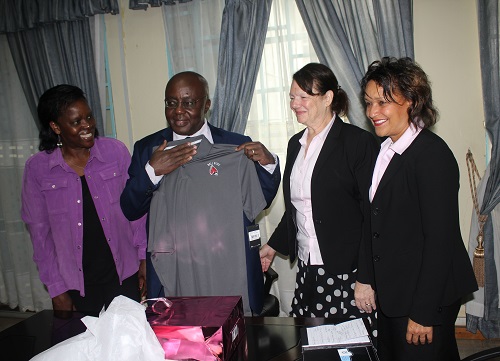 MMUST and Ball State University (BSU) rolled out plans to establish a Sickle Cell Anaemia Center in Western Kenya, on 9th July, 2018. This is part of strategies to help mitigate the devastating effects of this inherent blood disorder, which affects many people in Western Kenya, yet remains poorly understood in the entire African continent.
MMUST and Ball State University (BSU) rolled out plans to establish a Sickle Cell Anaemia Center in Western Kenya, on 9th July, 2018. This is part of strategies to help mitigate the devastating effects of this inherent blood disorder, which affects many people in Western Kenya, yet remains poorly understood in the entire African continent.
This comes after a meeting between a team led by MMUST Vice Chancellor, Prof. Eng. Fred Otieno with the Deputy Vice Chancellor Planning, Research and Innovation, Prof. William Shivoga, and the BSU Director School of Nursing, Prof. Linda Siktberg with her counterparts Prof. Sheila Abebe, and Prof. Winnie Mucherah, who is currently based in MMUST on a Carnegie African Diaspora Fellowship Program (CADFP).
Sickle Cell Anaemia is a genetically inherited disorder that causes abnormality in the Red Blood Cells (erythrocytes), causing the victims health to deteriorate due to poor supply of oxygen in the body. The disease has been found to be prone in Sub-Saharan Africa, Kenya being among the most affected countries, especially in the Western region.
Prof. Otieno welcomed the collaborative initiative of setting up a Sickle Cell Anaemia Center. He affirmed that practical plans are already in place to ensure this initiative is fully implemented. “This noble initiative is supported by the World Health Organization (WHO), and therefore, should be pioneered in the entire country as it also aligns with the Presidential Big Four Agenda of providing Affordable Health Care” he said.
Prof. Siktberg said that there is need to set up a Sickle Cell Anaemia Centre in MMUST to help the community reduce the cost of healthcare on individuals and improve their general community health. In a rejoinder, Prof. Abebe said “a larger percentage of infants in Sub-Saharan Africa are born with Sickle Cell Anaemia and hardly attain their fifth birth day”. Prof. Mucherah urged that people in this region should lead a healthy lifestyle and go for regular check-ups to increase life expectancy amidst the Sickle Cell Anaemia problem.
Prof. Shivoga praised the unique initiative saying that the first beneficiaries would be a number of MMUST staff whose family members suffer the disorder. He said that the community in this region largely depends on MMUST expertise and facilities, as this could help them get more understanding of Sickle Cell Anaemia management. Other MMUST members present included the Director of International Relations and Academic Linkages, Dr. Catherine Aurah, Dean School of Education, Dr. Judah Ndiku, Chairman Department of Educational Psychology, Dr. Kennedy Bota, Director Corporate Communications and Marketing, Dr. Dennis Ochieno, and the Community Liaisons Officer Mr. Oscar Waswa.




